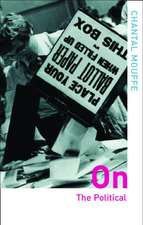Ideocracies in Comparison: Legitimation – Cooptation – Repression: Routledge Studies in Extremism and Democracy
Editat de Uwe Backes, Steffen Kailitzen Limba Engleză Hardback – 28 oct 2015
In the first part of the book, the contributors discuss the conceptual history of the ideocracy notion. The second part offers case studies pertaining to the Soviet State, Italy, the National Socialist Regime, the German Democratic Republic, the People’s Republic of China, North Korea and Cuba. Finally, the third part compares various ideocracies and draws together key themes.
Uniting the perspectives of history, philosophy and political science through the use of case studies and systematic comparisons, this book offers a unique examination of ideocracies both past and present which will be of interest to students and scholars researching political regimes, political history and comparative politics, as well as other disciplines.
Din seria Routledge Studies in Extremism and Democracy
-
 Preț: 303.84 lei
Preț: 303.84 lei -
 Preț: 349.17 lei
Preț: 349.17 lei -
 Preț: 295.34 lei
Preț: 295.34 lei - 8%
 Preț: 389.08 lei
Preț: 389.08 lei -
 Preț: 198.94 lei
Preț: 198.94 lei -
 Preț: 280.04 lei
Preț: 280.04 lei -
 Preț: 290.40 lei
Preț: 290.40 lei -
 Preț: 301.41 lei
Preț: 301.41 lei -
 Preț: 329.53 lei
Preț: 329.53 lei -
 Preț: 303.16 lei
Preț: 303.16 lei -
 Preț: 348.25 lei
Preț: 348.25 lei -
 Preț: 296.40 lei
Preț: 296.40 lei -
 Preț: 317.58 lei
Preț: 317.58 lei -
 Preț: 386.80 lei
Preț: 386.80 lei - 28%
 Preț: 823.99 lei
Preț: 823.99 lei - 22%
 Preț: 325.96 lei
Preț: 325.96 lei - 18%
 Preț: 1057.43 lei
Preț: 1057.43 lei - 18%
 Preț: 701.25 lei
Preț: 701.25 lei - 18%
 Preț: 1058.65 lei
Preț: 1058.65 lei - 18%
 Preț: 1059.48 lei
Preț: 1059.48 lei -
 Preț: 414.32 lei
Preț: 414.32 lei -
 Preț: 415.67 lei
Preț: 415.67 lei - 18%
 Preț: 1064.22 lei
Preț: 1064.22 lei -
 Preț: 445.38 lei
Preț: 445.38 lei - 18%
 Preț: 1005.80 lei
Preț: 1005.80 lei - 18%
 Preț: 1115.33 lei
Preț: 1115.33 lei -
 Preț: 425.43 lei
Preț: 425.43 lei - 18%
 Preț: 1056.28 lei
Preț: 1056.28 lei - 18%
 Preț: 1109.99 lei
Preț: 1109.99 lei -
 Preț: 481.58 lei
Preț: 481.58 lei - 18%
 Preț: 1054.71 lei
Preț: 1054.71 lei - 18%
 Preț: 699.21 lei
Preț: 699.21 lei - 18%
 Preț: 1000.87 lei
Preț: 1000.87 lei - 26%
 Preț: 821.13 lei
Preț: 821.13 lei -
 Preț: 418.55 lei
Preț: 418.55 lei - 22%
 Preț: 323.72 lei
Preț: 323.72 lei -
 Preț: 375.12 lei
Preț: 375.12 lei - 18%
 Preț: 1181.63 lei
Preț: 1181.63 lei - 18%
 Preț: 1057.13 lei
Preț: 1057.13 lei -
 Preț: 486.42 lei
Preț: 486.42 lei - 18%
 Preț: 1000.45 lei
Preț: 1000.45 lei - 18%
 Preț: 1057.09 lei
Preț: 1057.09 lei -
 Preț: 488.12 lei
Preț: 488.12 lei
Preț: 1064.19 lei
Preț vechi: 1297.79 lei
-18% Nou
Puncte Express: 1596
Preț estimativ în valută:
203.66€ • 211.84$ • 168.13£
203.66€ • 211.84$ • 168.13£
Carte tipărită la comandă
Livrare economică 15-29 aprilie
Preluare comenzi: 021 569.72.76
Specificații
ISBN-13: 9781138848856
ISBN-10: 1138848859
Pagini: 418
Ilustrații: 20
Dimensiuni: 156 x 234 x 28 mm
Greutate: 0.73 kg
Ediția:1
Editura: Taylor & Francis
Colecția Routledge
Seria Routledge Studies in Extremism and Democracy
Locul publicării:Oxford, United Kingdom
ISBN-10: 1138848859
Pagini: 418
Ilustrații: 20
Dimensiuni: 156 x 234 x 28 mm
Greutate: 0.73 kg
Ediția:1
Editura: Taylor & Francis
Colecția Routledge
Seria Routledge Studies in Extremism and Democracy
Locul publicării:Oxford, United Kingdom
Public țintă
Postgraduate and UndergraduateCuprins
Part I: Ideocracy: Term und Concept 1. "Ideocracy" – A Sketch of the History of a Concept 2. Ideocracy, or the Birth of Violence out of Detrivialized Morale 3. Ideological Self-Limitation in Ideocracies 4. Legitimation, Co-optation, and Repression in Ideocracies: A Rational Choice Perspective 5. Do Ideocracies Constitute a Distinct Subtype of Autocratic Regimes? Part II: Ideocratic Regimes in History and Present 6. Legitimation and Repression in the Soviet State (1917-1991) 7. Legitimation, Repression and Cooptation in Fascist Italy 8. Legitimation, Co-optation, and Repression in the National Socialist Regime 9. Legitimation, Repression and Co-optation in the German Democratic Republic 10. Fine-tuning Legitimation, Co-optation, and Repression in the People’s Republic of China 11. Ideocratic Legitimation in North Korea 12. Political Rule in Revolutionary Cuba between Legitimation, Co-optation, and Repression Part III: Ideocracies in Comparison 13. The Legitimizing Role of Palingenetic Myth in Ideocracies 14. Legitimation through Performance? Output Legitimacy in Autocratic Regimes 15. Characteristics of the Integration of Elites and Citizens in Ideocracies 16. National Socialist and Communist Violence Compared—A Contribution to the Research on Repression and Oppression in Ideocracies 17. Results
Notă biografică
Uwe Backes is deputy director at the Hannah Arendt Institute on Totalitarianism Research and Professor of Political Science at the Technical University of Dresden.
Steffen Kailitz is senior researcher at the Hannah Arendt Institute on Totalitarianism Research and teaches political science at the Technical University of Dresden.
Steffen Kailitz is senior researcher at the Hannah Arendt Institute on Totalitarianism Research and teaches political science at the Technical University of Dresden.
Descriere
In the first part of the book, the contributors discuss the conceptual history of the ideocracy notion. The second part offers case studies pertaining to the Soviet State, Italy, the National Socialist Regime, the German Democratic Republic, the People’s Republic of China, North Korea and Cuba. Finally, the third part compares various ideocracies and draws together key themes.
Uniting the perspectives of history, philosophy and political science through the use of case studies and systematic comparisons, this book offers a unique examination of ideocracies both past and present.
Uniting the perspectives of history, philosophy and political science through the use of case studies and systematic comparisons, this book offers a unique examination of ideocracies both past and present.














